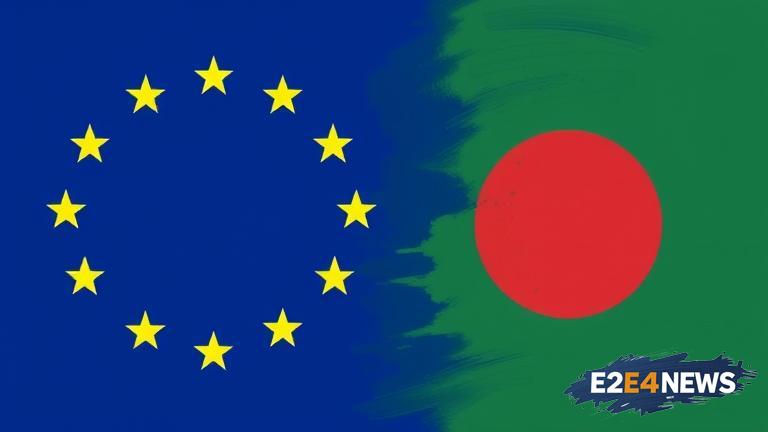The European Union has issued a statement urging all parties in Bangladesh to engage in peaceful dialogue ahead of the country’s upcoming elections. The EU’s call for calm and restraint comes as tensions rise in the South Asian nation, where political unrest and violence have been on the increase in recent months. With the elections looming, the EU has emphasized the need for a free and fair electoral process, where all parties can participate without fear of intimidation or violence. The EU’s statement has been welcomed by many in Bangladesh, who see it as a positive step towards promoting democracy and stability in the country. However, others have expressed skepticism, pointing out that the EU’s words need to be backed up by concrete actions. The EU has a long history of engagement with Bangladesh, and has provided significant financial and technical support to the country’s development efforts. Despite this, the EU’s relationship with Bangladesh has not always been smooth, with disagreements over issues such as human rights and trade. The upcoming elections are seen as a crucial test for Bangladesh’s democratic system, and the EU’s call for peaceful dialogue is likely to be closely watched by observers around the world. The EU has also urged the Bangladeshi government to ensure that the electoral process is transparent and accountable, with measures in place to prevent fraud and irregularities. This includes ensuring that the election commission is independent and impartial, and that all parties have access to the media and other resources. The EU has also emphasized the importance of respecting human rights and the rule of law during the electoral process, and has called on all parties to refrain from violence and intimidation. The situation in Bangladesh is complex and multifaceted, with a range of different factors at play. The country has a long history of political instability, and the current government has been accused of cracking down on opposition parties and civil society. Despite this, there are also many positive developments in Bangladesh, including a growing economy and significant progress on issues such as poverty reduction and education. The EU’s call for peaceful dialogue is likely to be seen as a positive step towards promoting stability and democracy in the country, and will be closely watched by observers around the world. The EU has a range of tools at its disposal to support democracy and human rights in Bangladesh, including diplomatic engagement, economic support, and technical assistance. The EU has also worked closely with other international partners, such as the United Nations and the United States, to promote democracy and stability in the region. The situation in Bangladesh is likely to remain complex and challenging in the months ahead, but the EU’s call for peaceful dialogue is a positive step towards promoting a more stable and democratic future. The EU’s statement has been welcomed by many in Bangladesh, who see it as a positive step towards promoting democracy and stability in the country. The EU’s call for peaceful dialogue is likely to be seen as a key test of the country’s democratic system, and will be closely watched by observers around the world. The EU has emphasized the importance of respecting human rights and the rule of law during the electoral process, and has called on all parties to refrain from violence and intimidation. The EU has also urged the Bangladeshi government to ensure that the electoral process is transparent and accountable, with measures in place to prevent fraud and irregularities. The EU’s statement is a positive step towards promoting democracy and stability in Bangladesh, and will be closely watched by observers around the world. The EU has a long history of engagement with Bangladesh, and has provided significant financial and technical support to the country’s development efforts. The EU’s relationship with Bangladesh is complex and multifaceted, with a range of different factors at play. The EU’s call for peaceful dialogue is likely to be seen as a positive step towards promoting stability and democracy in the country, and will be closely watched by observers around the world.
